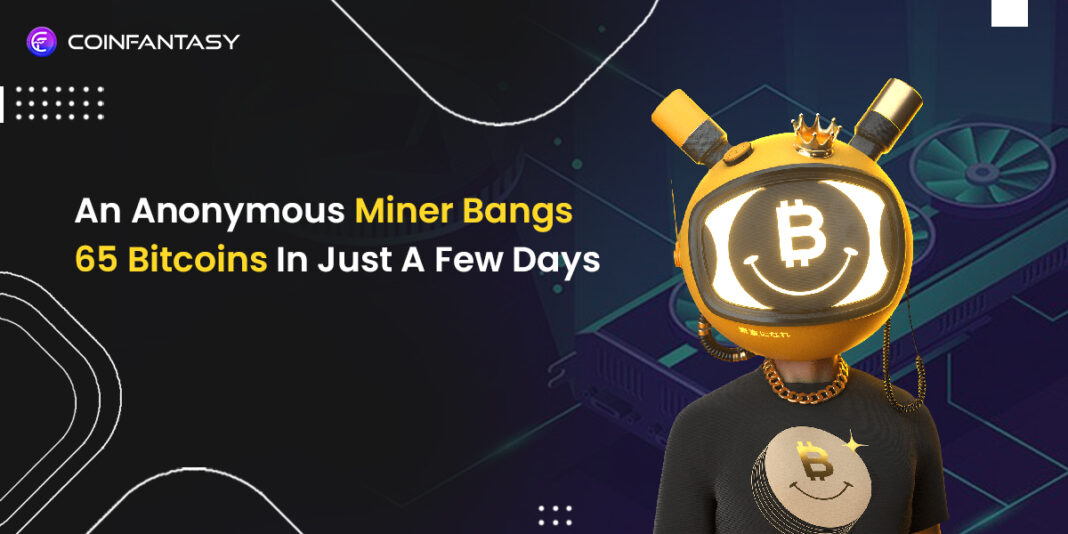In the past few hours, an anonymous miner or organization has additionally connected to the network and mined many blocks, earning 6.25 BTC as award money. The earning comes after the miner bangs 65 Bitcoins in a matter of a few days.
What’s interesting is that trackers are unable to figure out the real identity of the miner who has overtaken famous pools like Binance Pool, and AntPool, as well as massive mining sites like Foundry USA.
A Bitcoin miner has validated over 10 Bitcoin blocks in just one day, generating more than 65 BTC valued at almost $1.7 million at current pricing.
However, it is possible that a big performer is new to Bitcoin and has installed hundreds of mining machines to remain competing and correctly validate blocks, the unknown company is probably a pool of miners.
In proof-of-work algorithms such as Bitcoin, a collection of miners or commercial persons hosting mining nodes, may group and combine their computer’s processing power, known as hash rate, in pools. They have a possibility of confirming a block of Bitcoin transactions when they’re doing this.
In cooperation, the network immediately compensates them by offering not only the 6.25 BTC block payment but also the charges linked with the block. Although it is uncommon, fees gained in a block might exceed 50% of the block reward granted at the standard level.
Mining pools continue to take over as the Bitcoin hash rate rises and further miners will join. Many pools are still customized to satisfy the demands of individual miners.
Is this Bitcoin Mining Done by F2Pool?
The “unknown” organization is thought to be F2Pool. The mistake appears on trackers due to Mempool’s identification mechanism simply not recognizing them. It will be determined afterward if this is likewise true or not.
This is because identification is based on who the miner claims to be. It would be simple to imitate another pool, but there is no assurance that the other pool will catch on and say it was them.
F2Pool is one of the world’s earliest and strongest mining pools. The pool holds 8.19% of the entire Bitcoin hash rate, based on statistics from mempool.space.
Although it is well-known, current evidence suggests that there may have been an error in the identification reasoning. According to trackers, the most recent time F2Pool activity was recorded on May 24.
How the Whole Bitcoin Mining Process Works
Bitcoin has made accessible around 19 million of the entire 21 million coins that its underlying code will ever make public. Each day, approximately 900 additional Bitcoins are mined, and the overall quantity of Bitcoin available for mining varies every ten minutes.
Each block has a Bitcoin mining limitation that controls how much Bitcoin can go into circulation. Each block takes about 10 minutes for mining, thus usually 144 blocks are mined each day. At the present rate, roughly 900 BTC go into circulation each day as a result of the Bitcoin limitation and Bitcoin halving.
The Bitcoin blockchain platform is powered by a proof-of-work technique that pays Bitcoin miners for confirming transactions. Every network transaction block comprises 1,400 to 2,300 transactions, and miners are paid a set fee of 6.25 BTC for every additional block uploaded to the blockchain database.
According to professionals, the final Bitcoin will be generated around 2140. While 19 out of 21 million Bitcoins have now been mined, there is still a long way to go before the final phase of Bitcoin mining. Every four years, the overall quantity of Bitcoins produced in a single day decreases. This is due to the halving of the bonuses, or the quantity of Bitcoins mined with every new block.
According to current statistics, there are over one million Bitcoin miners. They are from all around the world, but the United States appears to be the biggest generous. Estimation of the total number of Bitcoin in existence from each nation depends in part on global electricity and energy costs.
Though it is difficult to determine the exact amount of Bitcoins deleted each day, experts think that about 3.7 million coins are lost permanently. This implies that around 20% of all Bitcoins are currently unavailable and are unable to be recovered.
They are either lost, burnt, or just forgotten, reducing the total quantity of Bitcoins in circulation. This increases their worth.
Closing Thoughts
Still, there is no exact information about the miner and no big mining pool firms like AntPool, ViaBTC, and F2Pool have claimed about it. The miner who bangs 65 Bitcoin was unknown to all and no one knows what he\she is going to do in the upcoming days. Mining pools keep gaining ground as Bitcoin hashing rates rise and the pool of miners grows. Simultaneously, certain pools are established to meet the issues of various miners. The image of a miner is impacted by its size, mining speed, and dependability.

